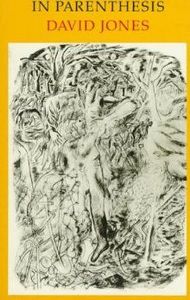"This writing has to do with some things I saw, felt, and was part of": With quiet modesty, David Jones introduces one of the grandest imaginative efforts to grapple with World War I. Fusing poetry and prose, gutter-speech and high music, Jones creates a panoramic picture of a hellish world of interminable waiting and unforeseen death, while remaining alert to the humanity that lights up even the wasteland of war. In Parenthesis, his Anathemata is considered one of the major works of twentieth-century poetry.
| LoC Classification |
PR6019.O53A6 1992 |
| Dewey |
821/.912 |
| Nationality |
British |
| Cover Price |
$25.95 |
| No. of Pages |
242 |
| Height x Width |
1.0
x
5.5
inch |
|
|
|
|
From Wikipedia:
"Although he had been trying to write about his wartime experiences since 1928, it was not until 1937 that Jones published his first literary effort. In Parenthesis, which was published by Faber and Faber with an introduction (in 1961) by T. S. Eliot, is a mixture of verse and prose-lines but the rich language establishes it as poetry, which is what Jones himself considered it. Jones's literary debut won praise from critics and from fellow-poets such as Eliot and W.B. Yeats, as well as garnering the Hawthornden Prize in the following year. Jones's style can be described as High Modernism; the poem draws on literary influences from the 6th-century Welsh epic Y Gododdin to Thomas Malory's Morte d'Arthur to the poetry of Gerard Manley Hopkins and Anabase by St. John Perse (translated by Eliot) to try to make sense of the carnage he witnessed in the trenches. An extract from In Parenthesis read by Jones himself in 1967 appears on the audiobook CD Artists Rifles.
With the outbreak of the First World War, Jones enlisted with the Royal Welch Fusiliers and served on the Western Front from 1915 to 1918 with the 38th (Welsh) Division. He served longer at the front than any other British war writer. His experiences in the trenches were to prove important in his later painting and poetry, especially his involvement in the fight at Mametz Wood."
